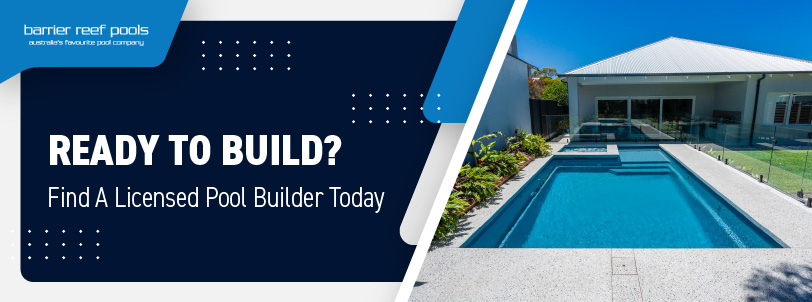How To Fix Minor Pool Issues Yourself Before Calling A Pro
When you own a fibreglass pool, small issues may pop up from time to time. The good news is that many of these can be managed with simple maintenance steps at home. From water clarity to routine equipment care, there are practical things you can check before deciding whether professional attention is needed. Here’s what you should know to keep your pool in good shape without overstepping into repairs.
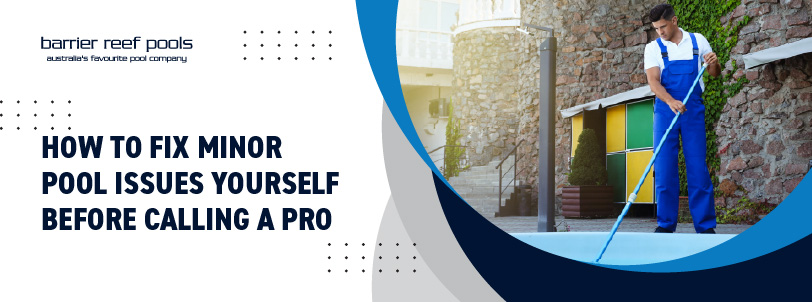
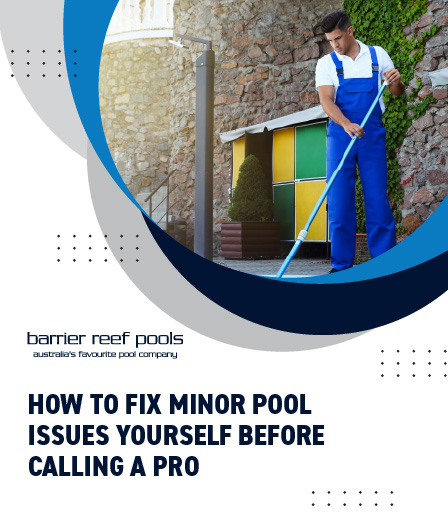
Fixing Common Pool Problems At Home
Owning a fibreglass pool means you enjoy lower maintenance compared to other pool types. Still, no pool is completely free from small challenges. Cloudy water, minor staining, or equipment running less efficiently are all common situations you may encounter. By checking these areas yourself, you can often restore your pool’s sparkle without needing urgent outside help. If you ever suspect damage, though, repairs should always be left to a licensed pool professional.
Spotting Water Quality Issues Early
The most common issue pool owners notice is cloudy or dull-looking water. This usually comes down to unbalanced chemistry or circulation problems. The first step is always testing your pool water. pH, chlorine, and alkalinity levels need to be in balance for your pool to remain clear. In many cases, adjusting your water treatment routine and giving your pump more run time will solve the problem. Acting quickly helps prevent bigger headaches later.
How to Spot Water Quality Issues Early
- Test your water first – Use a reliable test kit to check pH, chlorine, and alkalinity.
- Adjust chemicals as needed – Small corrections often bring the water back to balance.
- Run your pump longer – Circulation helps distribute treatments effectively.
- Remove debris – Leaves and organic matter left behind can quickly upset balance.
- Re-test after 24 hours – If clarity doesn’t improve, you may need further professional advice.
Handling Small Surface Stains
Fibreglass pools are designed to resist staining, but light marks can still appear from leaves, metals, or sunscreen. Most of the time, you can deal with these by brushing the surface or using a stain remover designed for fibreglass pools. The key is to catch stains early before they have a chance to set. Any deeper surface damage, however, should never be attempted as a DIY fix—this always requires professional care.
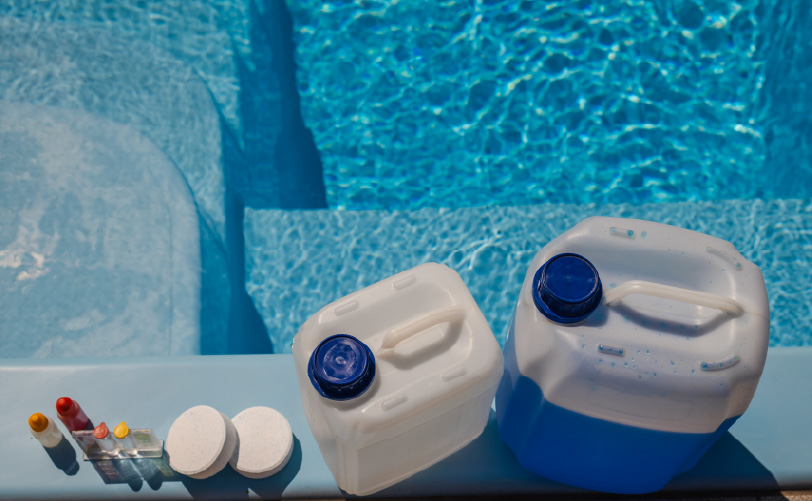
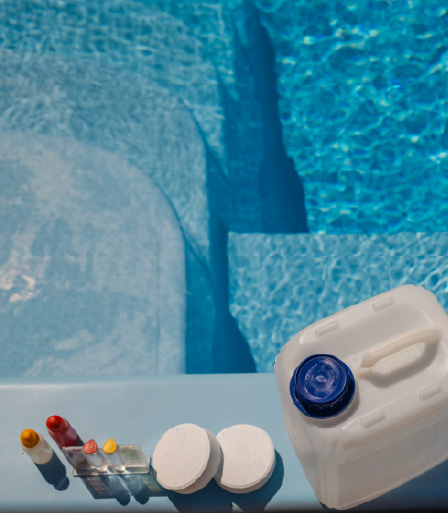
Steps To Manage Stains
- Identify the type of stain – Organic stains are usually green or brown, while metals often leave blue or rust-coloured marks.
- Brush gently – Always use a soft pool brush safe for fibreglass.
- Apply stain remover if needed – Choose products specifically for fibreglass surfaces.
- Rinse and circulate – Run your filtration to flush out treatment residue.
- Prevent build-up – Skim debris regularly and keep your water balanced.
Checking Your Filtration System
Your pool filter is the engine of clean, healthy water. If you notice poor water flow or debris staying in the pool after cleaning, it might be time for a simple maintenance task like rinsing or backwashing. Following the manufacturer’s instructions is essential to avoid damage. If a filter or any part of your system looks broken or faulty, stop there and call in a professional as DIY repairs can cause more harm than good.
Steps To Keep Your Filter Healthy
- Inspect weekly – Look for dirt build-up, unusual pressure readings, or slow water flow.
- Rinse or backwash as required – Clean cartridges with a hose or backwash sand filters as directed.
- Check the pressure gauge – A rise in pressure usually signals it’s time for a clean.
- Avoid over-cleaning – Overdoing it can shorten the life of filter media.
- Leave replacements to professionals – If cartridges or sand media need changing, seek expert help.
Watching For Water Loss
A drop in water level is not always a sign of a leak. Evaporation, splash-out, or backwashing can also lower levels. Still, it’s worth checking closely so you don’t mistake normal water loss for a problem. The “bucket test” is a simple way to compare natural evaporation to what’s happening in your pool. If you notice anything beyond minor water loss, that’s the point where a professional should always be called in.
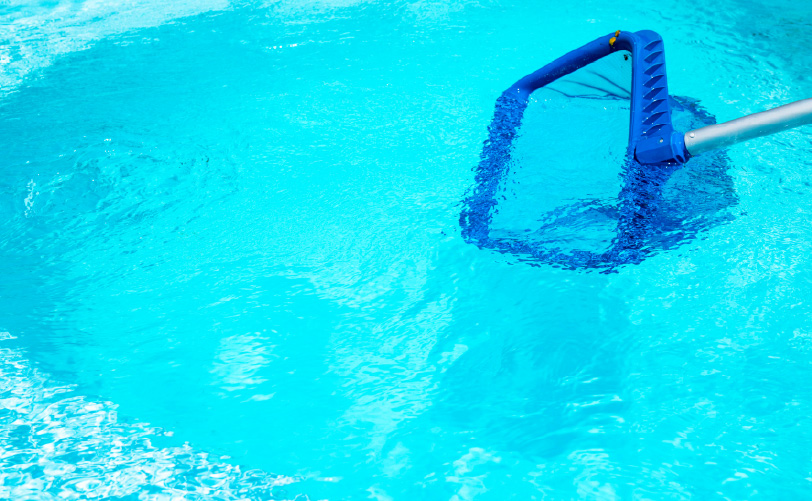
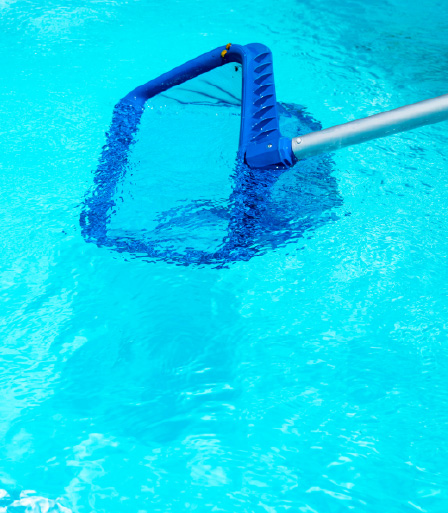
Steps To Monitor Water Levels
- Do the bucket test – Place a bucket of pool water on a step and mark both levels. Compare after 24 hours.
- Check for obvious causes – Splashing children or recent backwashing can lower levels.
- Inspect fittings visually – Look at skimmer boxes and return jets for drips or damp patches.
- Rule out evaporation – Hot weather can cause more loss than you expect.
- Seek help if levels drop quickly – Any significant water loss is a job for a licensed professional.
Maintaining Pool Equipment Regularly
Your pump, skimmer, and chlorinator work together to keep your pool water healthy. A few regular checks make sure they continue running smoothly. Simple cleaning and observation can often prevent bigger headaches. If you spot unusual noises, obvious wear, or something that looks broken, avoid the temptation to repair it yourself. Equipment servicing and part replacements should always be handled by trained professionals.
Steps For Routine Equipment Care
- Empty the pump basket – Clear out leaves and debris weekly.
- Check for blockages – Look inside the skimmer for trapped debris.
- Listen for odd sounds – Grinding, rattling, or screeching may indicate mechanical wear.
- Clean your chlorinator cell – Follow the manual to remove mineral build-up safely.
- Book seasonal maintenance – Have a professional check your system at least twice a year.
When To Call In The Experts
Even with regular care, there are limits to what you can do yourself. If problems keep coming back, if water balance seems impossible to control, or if equipment shows signs of damage, it’s time to bring in a licensed pool professional. At Barrier Reef Pools, we’re here to guide you with knowledge on caring for your fibreglass pool, but we don’t carry out repairs. For anything beyond routine cleaning and checks, always contact a qualified pool service technician.
Taking care of small maintenance tasks yourself keeps your pool looking and feeling great. You’ll save time and stress by catching issues early, but you’ll also avoid the risk of causing damage by leaving repairs to professionals. If you’d like more advice on fibreglass pool care or want to know the best way to keep your pool in top condition, contact Barrier Reef Pools today and make sure you’re getting the most from your swimming pool.

